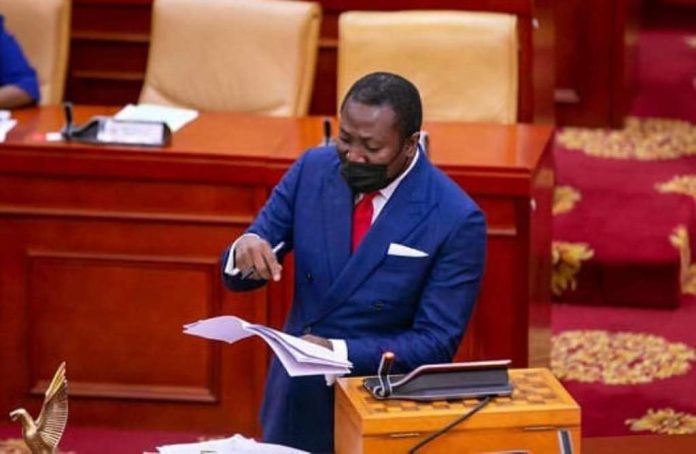Deputy Majority Leader Alexander Afenyo-Markin has said that the approval of the e-levy in Parliament on Tuesday March 29 was done within the laws of Ghana.
He said it was not illegal as is being claimed by the Minority who walked out during the approval.
Speaking in interview with TV3’s Parliamentary correspondent, Komla Kluste on Wednesday March 30, the Effutu lawmaker said “I don’t want to go into the technicalities that have been raised by our friends on the others ode, outside of Parliament. But I can tell you on good authority that we acted within the laws of Ghana, we acted within the confines of the constitution and what happened on the floor was legal.
“Suffice to say, as a political class, we should try as much as possible to resolve our problems as and when they come, these are political problems, if we always want to introduce laws into political problems we could run into cul-de-sac. That is what I will want all of us to discourage ourselves from doing. It may not end us well.
“The law operates in a manner that it can hit you at the wrong side and the law itself may get it wrong yet, the practicalities may present a different solution , so we have to be very careful on how we would always run to the law when we have a solution politically.
“That notwithstanding, I will say it is within the right of our colleagues in the Minority to express their disagreement. I have said that our friends have been very cooperative, as for disagreements you should expect it. They have their own party, we are in an enterprise of political competition.”
The National Democratic Congress (NDC) lawmakers have sued the Attorney General following the approval of the e-levy.
The Minority Leader Haruna Iddrisu described the approval as illegal and unconstitutional because in their view, the Majority did not have the right numbers to pass it.
“This is a charade,” he said at a press conference in Parliament, adding that “there is no E-levy.”
“The majority of less than 137 conducting businesses only proceeded on illegal and unconstitutional business. Parliament did not have the numbers to take any decision that should binding Parliament and Ghanaians,” he added.
They therefore decided to sue over the development.
Read below their reliefs they are seeking…
a. A declaration that on the authority of the Supreme Court case of Justice Abdulai v. Attorney-General, Writ No. J1/07/2|22 dated 9th March 2022, the constitutional quorum for decision-making and voting in Parliament within the meaning and intent of Article 104(1) of the 1992 Constitution is 138 Members of Parliament present in the Chamber of Parliament out of the 275 Members of Parliament; and not 136 Members of Parliament present in the Chamber of Parliament;
b. A declaration that in accordance with Article 104(1) of the 1992 Constitution of Ghana and on the authority of the Supreme Court case of Justice Abdulai v. Attorney-General, Writ No. J1/07/z022, on the 29h day of March 2022, when the Rt. Hon. Speaker of Parliament put the question for the second reading of the Electronic Transfer Levy Bill, 2021, Parliament lacked the required quorum to vote on the motion before the House, there being only 136 Members of Parliament present in the Chamber of Parliament:
c. A further declaration that by reason of relief (b) above, the purported vote on the motion for the second reading of the Electronic Levy Transfer Levy Bill, 2021 by the 136 Members of Parliament is in contravention of Article 104(1) and therefore null, void and of no effect whatsoever.
d. 4 declaration that in accordance with Article 104(1) of the 1992 Constitution of Ghana and on the authority of the Supreme Court case of Justice Abdulai v. Attorney-General, Writ No. J1/07/2022, on the 29h day of March 2022. when the Rt. Hon. Speaker of Parliament put the question for the Consideration of the Electronic Transfer Levy Bill, 2021 to the house, Parliament lacked the required quorum to vote on each clause of the Electronic Transfer Bill, 2021 before the House;
e. A further declaration that on account of relief (d) above, the purported vote by the 136 Members of Parliament on each clausę of the Electronic Transfer Bill, 2021 is in contravention of Article 104(1). and therefore null, void and of no effect whatsoever;
f. A declaration that in accordance with Article 104(1) of the 1992 Constitution of Ghana and on the authority of the Supreme Court case of Justice Abdulai v. Attorney-General, Writ No. J1/07/2022, on the 29th day of March 2022, when the Rt Hon. Speaker of Parliament put the question to the house for the Third Reading of the Electronic Transfer Levy Bill, 2021, Parliament lacked the required quorum to pass the said Electronic Transfer Bill, 2021;
g. A further declaration that on account of relief ( above the purported Third Reading and subsequent passage of the Electronic Transfer Levy Bill, 2021 is in contravention of Article 104(1) of the
Constitution, and is therefore null, void and of no effect.
h. An order of the Honourable Court setting aside the purported passage of the Electronic Transfer Levy Bill, 2021, bý the 136 Members of Parliament of the Majority Caucus present in the Chamber of Parliament on the 29th March 2022 as being unconstitutional, null and void;
i. Any other relief and/or order(s) the Honourable Court may deem it.
By Laud Nartey|3news.com|Ghana


